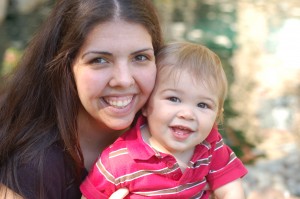Yesterday I wrote about Menininho’s evaluation by an audiologist.
I’ve got to be honest. I’ve gone through a range of emotions over the past couple of weeks since his 15 month checkup.
I’ve worried about being crazy. I mean, my family has REALLY crappy medical luck. With the exception of my mom, who “only” had cancer, my siblings, dad, and myself all have random, unrelated medical problems. Then there’s my extended family, and of course Mark. As I told the pediatrician a couple weeks ago, I’ve felt like I’m just waiting for the other shoe to drop sometimes, waiting to see what’s wrong with Menininho because it seems impossible that he would be totally healthy. As evidence mounted up over the past few months, I worried I was over-analyzing things because of our family history…being that crazy hypochondriac mom that every doctor loathes talking with.
I’ve been frustrated with the bureaucracy. I know my stuff. At the end of the day though, what happens with us is left to the hands of the doctors and other specialists. Mark and I have felt something was not right with our son for awhile, but we’ve had to go through that process to get his various tests and now to find the proper therapist.
I’ve been frustrated at Menininho sometimes. Things would be so much easier if he could just UNDERSTAND me! He understands “no” pretty consistently, even if he doesn’t always choose to obey it. I am not sure that, other than his name, he understands any other words. It makes daily tasks really difficult! Then I feel like a terrible mother for being frustrated at him and keep thinking that there must be something I have done to cause this (which all the doctors have said is not true, but doesn’t stop me from thinking it sometimes).
I get a pang of sadness (maybe jealously?) watching other kids interact with their parents. It’s particularly hard at church, where there are so many kids his age. It’s like a constant reminder to me that my son isn’t where he should be and every time someone comments on “what a talker” he is, I want to cry a little bit because it’s not talking, it’s mostly undecipherable gurgles.
Along those lines, I’ve had anger towards the few people we’ve told who have totally brushed it off or argued about it with me. I’m. His. Mother. I spend more time with him than anyone else. There is no one who knows my son like I do. I’ve also gotten mad at people who have no idea what’s going on though, which is not really fair. Like, over Mothers’ Day a woman asked me if my son was talking yet. I said no. She proceeded to ask if he could say this word or that word and each time I repeated “no, he doesn’t talk yet.” When she started insisting that she’d heard Menininho say a word, I just walked away.
And exhaustion. I feel mentally exhausted. I’ve been reading, and talking with friends in the field, and doing assessments on Menininho, trying to figure out what the speech therapist might want to know so that I’ll have that information ready. It’s a lot, or it feels like a lot. I wish I knew where this was going to take us, but I don’t.
Here are my parting thoughts. I’m no expert on this of course, but I’ve already thought of a few dos and don’ts if you’re in the position of supporting a parent going through this process.
Don’t:
1) Ask if the child has said a word yet. I know that when my son finally says his first word, I will proclaim it from the mountaintops, Facebook, Twitter, my blog, and texting. Until then, assume no news is no news.
2) Tell me about your friend’s cousin’s half brother’s neighbor who miraculously caught up to where he was supposed to be all on his own, within a month, and learned to speak 5 other languages to boot. This is not the same thing.
3) Say “well, it could be worse.” I’m on Twitter. I correspond regularly with families who have had devastating things happen to them. I know it could be worse. Doesn’t mean I don’t have a right to grieve my son’s challenges too.
Do:
1) Ask how the diagnostic process or therapy is going.
2) Offer a listening ear.
3) Be optimistic (just realize there can be a fine line between optimism and being dismissive. Comments like “You’re doing a great job” or “You caught this early” are more comforting than “everything’s going to be fine.”)
4) Offer advice if you’ve actually been there, or if you happen to be a related professional. I know I’ve appreciated the suggestions of which doctors to see when and what books to read or therapies to ask about.
Mark and I are extremely grateful to everyone who has supported us thus far. The emails, tweets, and blog comments have been a huge lift to us. Thank you.


13 Comments
Leave a reply →